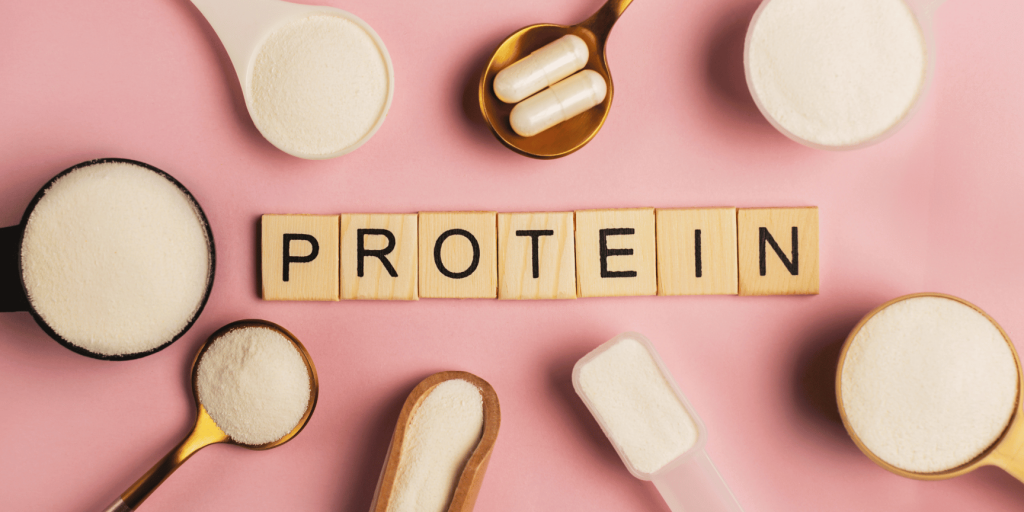Protein powders – what to know

Protein powders are the most common dietary supplement chosen by athletes. It is also not uncommon for regular gym-goers, people who train intensively every day and people who are losing weight to use them. Are they worth introducing into the diet? Who should use them? That’s what you’ll find out in this article.
Protein is one of the basic macronutrients in the diet. It is essential for the proper development of the body, hormonal and immune processes. Proteins are also carriers of vitamins and help regulate blood pressure. Too little of this macronutrient in the diet, can cause deficiencies. Without protein in the diet, it is impossible for the body to develop, heal wounds, brain function and immunity to disease are impaired.
Sources of protein
The body’s requirement for protein is 12-20% of daily caloric needs. Most of us are able to provide this dose in our daily diet, without additional supplementation.
Plant-based proteins
We can get protein from both plant and animal products. However, it is important to remember that plant products provide incomplete protein. What does this mean? These proteins do not have all the essential amino acids. We need the aforementioned amino acids because our body cannot produce them on its own. In order not to lead to their deficiency, they must be supplied from the diet. Most plant proteins can be found in:
- pulses,
- cereals,
- Soybeans and soy products,
- nuts and seeds.
Read more about vegan protein sources here.
Animal proteins
Proteins of animal origin are absorbed better in our bodies. They have fewer substances in their composition that hinder their absorption. Such substances include dietary fiber and enzyme inhibitors, i.e. substances that hinder the action of digestive enzymes and reduce the digestibility of protein. Most animal protein is found in:
- meat,
- fish and seafood,
- eggs,
- milk and dairy products.
What is a protein powder?
Another source of protein is protein nutrition. But actually, what is it? A protein powder is a dietary supplement that provides concentrated, easily digestible protein. Such a nutrient can be a stand-alone meal or a supplement.
Protein powders of animal origin
We can divide nutrients by the type of protein that is in its composition.
Whey protein powders
Whey protein (whey protein – WP) is one of the main proteins of milk. This protein is a complete protein, that is, it contains all the essential amino acids. High-quality whey nutrient contains adequate amounts of leucine and results in maximum intensification of muscle protein synthesis.
Casein protein powders
Casein is another major milk protein. Casein molecules are larger than whey and therefore take longer to digest. Casein contains glutamine, which has a regenerative effect on muscles after exercise. Casein supplements are recommended for use before bedtime for effective recovery after a hard workout.
Other animal proteins
Much less popular on the market are chicken egg protein powders and beef protein powders. Chicken eggs have complete protein, but take a long time to absorb. The price of such nutrients is definitely higher than the others. Beef proteins are absorbed at a similar level to vegetable proteins. These nutrients are created from the tendons and cartilage of beef. Beef protein powder can have a positive effect on tendon and joint health.
Protein powders for vegans and vegetarians
With the growing interest in vegan and vegetarian diets, there are more and more products on the market aimed at this consumer group.
Soy protein powders
Soy has the most valuable plant protein. For this reason, it is often used in the production of protein powders for vegans. Soy protein contains sizable amounts of arginine, which has been shown to have a positive effect in post-workout recovery.
Other plant protein powders
Protein powders made from: wheat, pea, rice protein and hemp also appear on the market. These proteins are definitely of lower quality. It is recommended that they be used in a mix with other proteins.
Division of protein powders – form of occurrence
Protein concentrates
Nutrition in the form of whey concentrate (WPC) contains 29-89% protein in the composition. It is one of the most commonly chosen nutrients. It is used alone or mixed with another form of protein. This protein has a medium absorption time.
Protein isolates
Whey protein isolates (WPI) contain less than 90% protein. They are also very commonly offered on store shelves. Isolates are used alone or mixed with another form of protein. Soy proteins are most often found in this form.
Protein hydrolysates
In whey protein hydrolysate (WPH) you will find less than 90% protein. Hydrolysates are expensive compared to other forms of nutrients. They are characterized by a more bitter aftertaste. Enzymes are used to produce these nutrients.
Whey powder (PP)
In this nutrient, you will find the least protein of 11-14.5%. For this reason, it is the rarest choice of consumers.
Who should use protein powders?
For athletes, supplementing protein needs without the help of supplements can be difficult, though not impossible. The average person with average activity will easily supplement their needs for this macronutrient with a properly balanced menu. So who might consider implementing supplementation?
Athletes and people with high physical activity
Athletes performing endurance sports need about 1.2-1.4 g of protein/kg of body weight. Speed and strength disciplines require even more than 2 g/kg of body weight. Such a high requirement is difficult to supplement with diet. An athlete does not feed on protein alone. He also needs other macronutrients, vitamins and minerals. Very often the problem lies in the amount of food. Athletes are not able to overeat such an amount of food. And it is they who often introduce protein powders into their diet.
Vegans, vegetarians and people who limit meat
Nowadays, a lot of people choose to give up animal products. The diets of many of them are not properly balanced and do not provide adequate amounts of protein. This may be due to, among other things, too little variety in the menu or lack of awareness of protein sources. In addition, plant products provide a lot of fiber and, therefore, plant-based diets are high in fiber. This makes it, as with professional athletes, difficult for those on a plant-based diet to consume enough food to provide an adequate supply of protein. Plant-based protein powders are a good solution in such cases.
Nutritional deficiencies
Protein powders are very often indicated by doctors for sick people who struggle with protein deficiencies. In the course of many diseases, the need for protein increases. In such cases, for sick people, nutritional supplements are a necessity. The demand for protein in some diseases, including cancer, increases significantly. Such people especially need to pay attention to the level of protein in their diet. In case of deficiencies, consult a doctor before choosing a protein powder.
How to use protein powder
Protein powders should be included in the diet when you fail to meet your daily protein requirements with your diet. The amount of nutrients should be adjusted according to the protein deficit of the day. The usual serving of protein is 30 g of protein powder. Of course, each manufacturer puts information on the package and it should be followed. Protein nutrients can be used at any time of the day. For their effect to be most beneficial, it is best to use them as a peri-workout meal.
Before training, it is advisable to supplement with a protein that is quickly assimilated, such as an isolate. Such a meal can be breakfast. Protein conditioner can be added to this meal in the form of a shake or as an addition to pancakes, omelets or pancakes.
After a workout, it is best to consume the meal up to 120 minutes after the workout. Supplemented protein helps with muscle building and recovery. You can read more about peri-workout nutrition here.
To ensure adequate recovery, it’s a good idea to include casein supplements in your nutrition before bedtime. They support the body’s regenerative processes. Through their long absorption, they will ensure adequate protein digestion time in the body.

What to look for when choosing a protein powder
Protein content
When choosing a protein powder, pay attention to the protein content. The more of it, the better. Ideally, the percentage of protein should be above 80%.
Content of essential amino acids
The best protein powders should provide all essential amino acids. These are those that the body can not produce on its own. This group includes lysine, leucine, isoleucine, valine, methionine, phenylalanine, tryptophan, threonine, and histidine.
Opinion of specialists and price
When choosing a protein powder, you should also consider the price and the opinion of specialists. It is always a good idea to consult a nutritionist or doctor. Specialists will determine whether such supplementation is necessary.
Are protein nutrients healthy?
Protein powders are highly processed products. These products are supplements, so they should only supplement the diet. The nutrient itself should not be understood as the main component of the diet, since it contains negligible amounts of carbohydrates, vitamins and minerals. Sweeteners are responsible for the taste. Acesulfame K, cyclamates or sucrose are often added to nutritional supplements. These substances can cause glycemic disorders and do not have a positive effect on intestinal health.
Summary – is it worth using protein powders?
Protein nutrients are worth introducing into your diet if your protein requirements are very high or your diet is deficient in protein. You should consider nutrients as a supplement that is only intended to supplement your diet. Including them in your diet, should be consulted with a nutritionist or doctor.
Fitatu® app
Download the app from the Play Store or Apple Store and find out that dieting has never been so easy!
Do you care about convenience and achieving your goals faster? Opt for Fitatu® Premium! We’ve prepared a special discount code for blog readers: PROTEIN-X. Go to https://www.fitatu.com/app/order-and-payment and grab a 20% discount on Fitatu® Premium annual plans.
What else will you find in Fitatu® Premium?
- More than 2,000 recipes plus dozens of new ones every month,
- additional intermittent fasting plans,
- the ability to create shopping lists,
- pre-made menus with meals,
- filtering of products and recipes,
- more synchronization with fit apps,
- web-based access to the app,
- no ads!
Bibliography:
- Normy żywienia dla populacji Polski i ich zastosowanie 2020, pod redakcją Mirosława Jarosza, Ewy Rychlik, Katarzyny Stoś, Jadwigi Charzewskiej
- Dietetyka Sportowa, 2019, pod redakcją Barbary Frączek, Jarosława Krzywańskiego,Huberta Krysztofiaka
- Presleep Casein Protein Ingestion: Acceleration of Functional Recovery in Professional Soccer Players, William Abbott , Adam Brett , Emma Cockburn , and Tom Clifford
- https://strefamocy.pl/pl/75-mieszanki-bia%C5%82ek
- Daytime and nighttime casein supplements similarly increase muscle size and strength in response to resistance training earlier in the day: a preliminary investigation. Joy, J. M., Vogel, R. M., Shane Broughton, K., Kudla, U., Kerr, N. Y., Davison, J. M., Wildman, R., & DiMarco, N. M. (2018). Journal of the International Society of Sports Nutrition, 15(1), 24. https://doi.org/10.1186/s12970-018-0228-9
- https://ncez.pzh.gov.pl/abc-zywienia/bialko-w-diecie-sportowca/
- Jay Rabindra Kumar Samal & Indira R. Samal (2017): Protein Supplements: Pros and Cons, Journal of Dietary Supplements, DOI: 10.1080/19390211.2017.1353567
Older entries:
- Overview of materials intended for contact with food. What should kitchenware be made of?
- Demystifying fat: How many calories are in a fat?
- Sweet but smart snacks for kids : A look at popular sweets and healthier alternatives
- Fat in a weight loss diet — Enemy or ally?
- 11 tips on how to prepare meals faster





